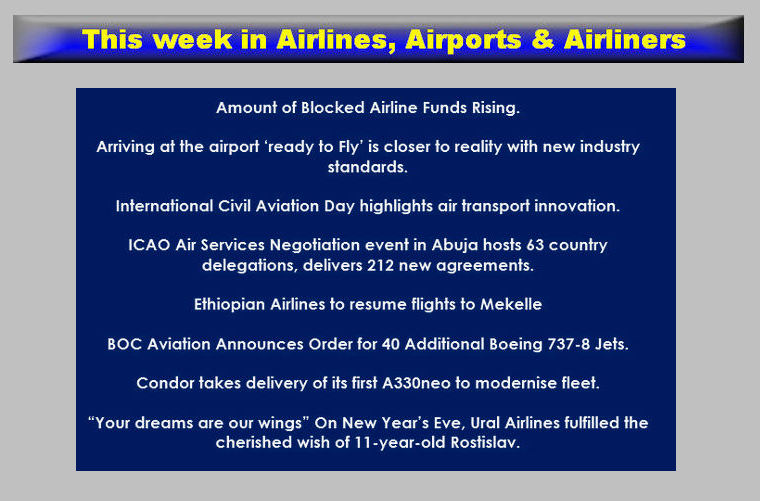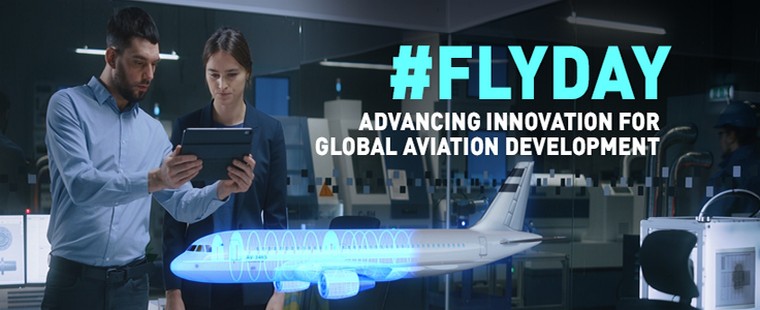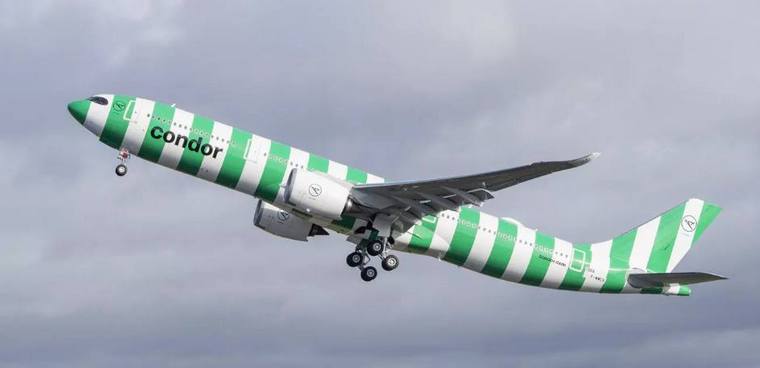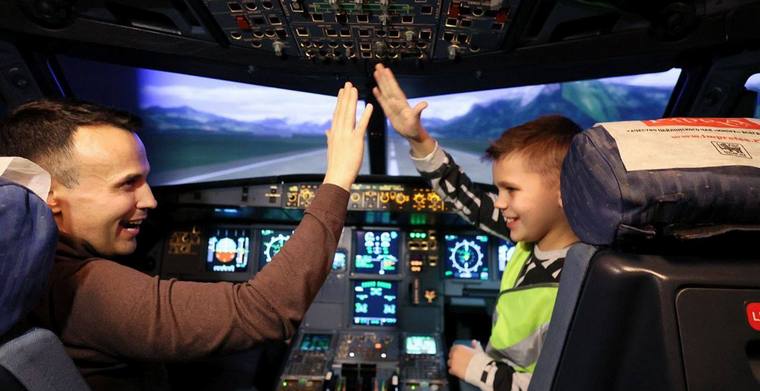



























Airlines, Airports and Airliners 8 January 2023
Compiled by Willie Bodenstein
Google Banner Ad

AMOUNT OF BLOCKED AIRLINE FUNDS RISING

The International Air Transport Association (IATA) warned that the amount of airline funds for repatriation being blocked by governments has risen by more than 25% ($394 million) in the last six months. Total funds blocked now tally at close to $2.0 billion. IATA calls on governments to remove all barriers to airlines repatriating their revenues from ticket sales and other activities, in line with international agreements and treaty obligations.
“Preventing airlines from repatriating funds may appear to be an easy way to shore up depleted treasuries, but ultimately the local economy will pay a high price. No business can sustain providing service if they cannot get paid and this is no different for airlines. Air links are a vital economic catalyst. Enabling the efficient repatriation of revenues is a critical for any economy to remain globally connected to markets and supply chains,” said Willie Walsh, IATA's Director General.
Airline funds are being blocked from repatriation in more than 27 countries and territories.
The top five markets with blocked funds (excluding Venezuela) are:
Pakistan: $225 million
Bangladesh: $208 million
Lebanon: $144 million
Algeria: $140 million
Nigeria
Total airline funds blocked from repatriation in Nigeria are $551 million. Repatriation issues arose in March 2020 when demand for foreign currency in the country outpaced supply and the country's banks were not able to service currency repatriations.
Despite these challenges Nigerian authorities have been engaged with the airlines and are, together with the industry, working to find measures to release the funds available.
“Nigeria is an example of how government-industry engagement can resolve blocked funds issues. Working with the Nigerian House of Representatives, Central Bank and the Minister of Aviation resulted in the release of $120 million for repatriation with the promise of a further release at the end of 2022. This encouraging progress demonstrates that, even in difficult circumstances, solutions can be found to clear blocked funds and ensure vital connectivity,” said Kamil Al-Awadhi as Regional Vice President for Africa and the Middle East.
Venezuela
Airlines have also restarted efforts to recover the $3.8 billion of unrepatriated airline revenues in Venezuela. There have been no approvals of repatriation of these airline funds since early 2016 and connectivity to Venezuela has dwindled to a handful of airlines selling tickets primarily outside the country. In fact, between 2016 and 2019 (the last normal year before COVID-19) connectivity to/from Venezuela plummeted by 62%. Venezuela is now looking to bolster tourism as part of its COVID-19 economic recovery plan and is seeking airlines to restart or expand air services to/from Venezuela. Success will be much more likely if Venezuela is able to instil confidence in the market by expeditiously settling past debts and providing concrete assurances that airlines will not face any blockages to future repatriation of funds.
Google Banner Ad

The International Air Transport Association (IATA) has developed industry standards which will bring the aim of having travellers arrive at airports ready-to-fly one step closer to reality. The newly released Recommended Practice on Digitalization of Admissibility will enable travellers to digitally prove admissibility to an international destination, avoiding a stop at the check-in desk or boarding gate for document checks.
Programs are already in use in various airports enabling travellers to move through airport processes such as boarding without producing paper documentation because their boarding pass is linked to a biometric identifier. But in many cases travellers would still have to prove their admissibility at a check-in desk or boarding gate with physical checks of paper documentation (passports, visas and health credentials for example).
The Digitalization of Admissibility standard will advance the realization of One ID with a mechanism for passengers to digitally obtain all necessary pre-travel authorizations directly from governments before their trip. By sharing the “OK to Fly” status with their airline, travellers can avoid all on-airport document checks.
“Passengers want technology to make travel simpler. By enabling passengers to prove their admissibility to their airline before they get to the airport, we are taking a major step forward. The recent IATA Global Passenger survey found that 83% of travellers are willing to share immigration information for expedited processing. That is why we are confident this will be a popular option for travellers when it is implemented. And there is good incentive for airlines and governments as well with improved data quality, streamlined resourcing requirements and identification of admissibility issues before passengers get to the airport,” said Nick Careen, IATA's Senior Vice President for Operations, Safety and Security.
What travellers will be able to do in future:
Create a verified digital identity using their airline app on their smart phone.
Using their digital identity, they can send proof of all required documentation to destination authorities in advance of travel
Receive a digital 'approval of admissibility' in their digital identity/passport app.
Share the verified credential (not all their data) with their airline
Receive confirmation from their airline that all is in order and go to the airport.
Data Security
The new standards have been developed to protect passengers' data and ensure that travel remains accessible to all. Passengers remain in control of their data and only credentials (verified approvals, not the data behind them) are shared peer-to-peer (with no intermediating party). This is interoperable with the International Civil Aviation Organization's (ICAO) standards, including those for the Digital Travel Credential. Manual processing options will be retained so that travellers will have the ability to opt out of digital admissibility processing.
“Travelers can be confident that this process will be both convenient and secure. A key point is that information is shared on a need-to-know basis. While a government may request detailed personal information to issue a visa, the only information that will be shared with the airline is that the traveller has a visa and under which conditions. And by keeping the passenger in control of their own data, no large databases are being built that need protecting. By design we are building simplicity, security and convenience,” said Louise Cole, IATA's Head Customer Experience and Facilitation.
Timatic
IATA's Timatic offering is helping deliver the One ID vision with trusted entry requirement information for airlines and travellers. Integrating Timatic into the apps providing entry requirements registry model brings with it an established process for the global collection, verification, updating and distribution of this information.
Google Banner Ad

International Civil Aviation Day (ICAD), celebrated on 7 December each year, commemorates States' signing of the Convention on International Civil Aviation (Chicago Convention) in 1944. ICAO Council President Salvatore Sciacchitano, and Secretary General Juan Carlos Salazar, have issued statements which promote the ICAO Council's ICAD theme of:
Advancing Innovation for Global Aviation Development
During the 40th Session of the ICAO Assembly, in 2019, countries adopted a resolution on Innovation in Aviation, recognizing the significant potential of current cutting-edge aeronautical and scientific developments to dramatically improve air transport environmental sustainability, in addition to aviation safety, efficiency, security, facilitation, and economic development. It also drew attention to the role of ICAO in accompanying its Member States in the integration of these new technologies in the civil aviation system.
ICAO has established an online Innovation site and is working to promote and accelerate the adoption of new technologies and approaches for civil society benefit. It has also launched a related global youth competition at this year's ICAO Innovation Fair.
Innovations can also lead to more efficient and streamlined aviation regulatory processes, and a new ICAO Transformational Objective and 2023-2025 Business Plan are in progress.
7 December statement of Mr. Salvatore Sciacchitano, ICAO Council President
Every year on 7 December, the global community celebrates International Civil Aviation Day.
This year, we celebrate International Civil Aviation Day with a heightened sense of hope, and great confidence for the future, the theme being Advancing Innovation for Global Aviation Development.
But at the same time, the waning pandemic has reinforced our collective awareness of the fragility of our global village, and of aviation's critical role in keeping it connected when humanity needs it most.
The States participating at this year's 41st ICAO Assembly have accordingly adopted important decisions supporting the future safety, security, and sustainability of air transport, including a key global agreement to achieve its total decarbonization by 2050.
The ICAO Council's theme for International Civil Aviation Day therefore focuses public and private sector leaders on the key role that innovation is playing in realizing this crucial new vision for 21st century air transport, and as a United Nations agency, ICAO will continue to support and accelerate the critical technological progress required to assure that aviation can continue to play its part for our world and its societies.
7 December statement of Mr. Juan Carlos Salazar, ICAO Secretary General
This International Civil Aviation Day, ICAO is once again promoting the key importance of enabling innovation for aviation development, while celebrating countries' recent and very successful negotiations toward a new vision for more sustainable and resilient global flights.
This agreed long-term global goal of net-zero air transport carbon emissions by 2050 is ambitious and attainable, and cutting-edge innovations in aircraft fuels, design, and propulsion will play a major role in how we achieve it.
States have also adopted some key strategic decisions this year in the triennial Assembly on how to better prepare the sector for future public health and other types of crises, and here too innovation will play a critical part in assuring every passenger's expectation in terms of the safety, security, health, reliability, and convenience of their air travel experience.
Several world regions have seen a full return to pre-pandemic air traffic levels for commercial passenger travel, and there continues to be a positive outlook for a full world air transport recovery, as we continue our collective efforts in the aviation community to reconnect the world. A sustainable and more resilient future for aviation is fully achievable, and as always we will accomplish it by working together with our Member States and other partners and stakeholders.
Google Banner Ad

Ethiopian Airlines, the largest network operator in Africa, is pleased to announce the resumption of its flights to Mekelle. Regarding the flight resumption, Ethiopian Airlines Group CEO Mr. Mesfin Tasew said "We are truly pleased with the resumption of our flights to Mekelle.
With planned daily flights to Mekelle, Ethiopian will increase the daily frequency depending on the demand on the route. Ethiopian currently operates to a total of 20 domestic destinations currently and plans to increase this number in the coming years.
Google Banner Ad

In his opening remarks to the international negotiators, ICAO Council President Salvatore Sciacchitano expressed the collective gratitude of ICAO and all present to the President of the Federal Republic of Nigeria, His Excellency Muhammadu Buhari, who was represented at the event's opening ceremonies by his Chief of Staff, Professor Ibrahim Gambari.
He also emphasized that ICAN 2022's attendance level was an important reminder “that the progressive resurgence of the air transport industry is proceeding at a post-pandemic pace,” noting that the agreements to be finalized there would only add to the recovery's momentum.
“Multilateralism and the work embarked on here continue to be essential to global success,” he added, “and to the restoration of global travel, trade and tourism capacity in all world regions.”
Since the launch of ICAN in 2008, the ICAO forum has grown and evolved to the point that it has played host to over 5,000 bilateral meetings, resulting in close to 4,000 agreements and arrangements.
ICAO promotes several key priorities for States when supporting their air services negotiations, including liberalized market access for airlines, the removal of barriers to access wider capital markets, and relaxed nationality requirements for airlines' ownership, and the UN agency is presently working on a new Convention on Foreign Investment in Airlines to help support this multilateral progress.
Further priorities include commitments to convergent and effective regulatory practices supported by good governance, and recognition of the need for modernized infrastructure and passenger facilitation processes to support future safety, security, emissions, capacity, and resilience objectives.
All of the above are also expected to be accompanied by effective national competition and consumer protection frameworks, and full compliance with current ICAO policy guidance on taxes, charges, and fees.
“The work undertaken during this ICAN event is critical to all aspects of ICAO's air transport objectives, as well as to the future sustainable growth and resilience of international aviation in the post-COVID-19 era,” remarked President Sciacchitano.
“ICAO will continue to maintain its firm commitment to work with States, regional and sub-regional bodies in the development of measures to foster cooperation, including the development of liberalized arrangements towards achieving the long-term vision for international air transport liberalization,” he concluded.
While in Abuja, President Sciacchitano also discussed further priorities for Nigerian, African, and global air transport with President Muhammadu Buhari and the Minister of Aviation of Nigeria, Senator Hadi Sirika.
The President's activities in Nigeria were supported by the Director of ICAO's Air Transport Bureau, Mr. Mohamed Rahma, and by ICAO's Regional Director for Western and Central Africa, Mr. Prosper Zo'o Minto'o.
Google Banner Ad
BOC AVIATION ANNOUNCES ORDER FOR 40 ADDITIONAL BOEING 737-8 JETS

BOC Aviation Limited and Boeing [NYSE:BA] today announced that the airplane lessor is growing its 737 MAX portfolio with an order for 40 additional 737-8 jets. With the order, BOC Aviation is advancing its strategy of purchasing new, fuel-efficient, environmentally sustainable airplanes that are in demand with airline customers.
Boeing continues to see strong market demand for the 737 MAX family, with more than 1,500 gross orders since late 2020.
"We are proud that BOC Aviation continues to invest in the 737-8 with its industry-leading versatility and ability to fly almost any short- and medium-haul market profitably," said Ryan Weir, vice president of Global Leasing Sales, Boeing Commercial Airplanes. "We look forward to more opportunities to expand our relationship to support BOC Aviation and its customers."
The 737-8 is designed to offer more fuel efficiency, reliability and flexibility in the single-aisle market. The airplane can fly 3,500 nautical miles - about 600 miles farther than its predecessor - allowing airlines to profitably serve new and more direct routes for passengers. Compared to the airplanes it replaces, the 737-8 also delivers superior efficiency, using 20% less fuel and significantly reducing CO2 emissions and operating costs.
Google Banner Ad

German Airline Condor Flugdienst GmbH has taken delivery of its first A330-900 widebody aircraft out of an order of 16 A330neo aircraft. The A330neo will replace previous generation aircraft in their fleet to reduce Condor's operating costs as well as fuel consumption and CO2 emissions by 25 percent. Condor's A330neo will offer unrivalled passenger comfort and will accommodate 310 passengers, featuring 30 seats in Business, 64 seats in Premium Economy and 216 seats in Economy class.
Condor has selected in July 2022 the A320neo Family to modernise its Single-Aisle-fleet. By operating the A320neo and A330neo aircraft side by side, Condor will benefit from the commonality economics these two aircraft Families offer.
The A330neo is the new generation version of the popular A330 widebody. Incorporating the latest generation Rolls-Royce Trent 7000 engines, new wings and a range of aerodynamic innovations, the aircraft offers a 25 percent reduction in fuel consumption and CO2 emissions. The A330-900 is capable of flying 7 200 nm / 13 334 km non-stop.
At the end of November, the A330 Family had registered a total of over 1,700 firm orders of which 275 are A330neos from 24 customers.
Google Banner Ad
“YOUR DREAMS ARE OUR WINGS”: ON NEW YEAR'S EVE, URAL AIRLINES FULFILLED THE CHERISHED WISH OF 11-YEAR-OLD ROSTISLAV.

The balloon with the wish of young Rostislav was removed from the Wish Tree by Vladimir Yakushev, Plenipotentiary Representative of the President in the Urals Federal District.
Rostislav dreamed of being in the cockpit, and his wish came true right on his birthday! Together with his mother, two brothers and sister, he visited our aviation technical centre, where, accompanied by senior instructor Yuri Popov, he saw aircraft, stroked their white sides, walked around the cabin, examined the buttons and toggle switches in the cockpit with interest, sat in the commander's chair. And then, in the company of the pilot-instructor of Ural Airlines Vyacheslav Tarakanov, he made a trained flight and successfully landed at the Salzburg airport on an aircraft simulator.
“The child is happy. No amount of money can buy this. Thank you all very much! And we are happy, of course, that he is happy. Yes, Rostik, great! I think now he will definitely become a pilot,” said Elena Bedrina, Rostislav's mother.
“Fulfilling dreams, especially children's ones, is a great happiness. After all, these are the sincerest and kind wishes. When they come true, the child strengthens his faith in people and opens up opportunities for himself. Bright and kind memories of the fulfilled desire remain with him for the rest of his life, inspiring him to achieve and giving confidence in his own abilities,” Vladimir Yakushev emphasized.
Google Banner Ad

 |
 |
 Copyright © 2024 Pilot's Post PTY Ltd
The information, views and opinions by the authors contributing to Pilot’s Post are not necessarily those of the editor or other writers at Pilot’s Post.
Copyright © 2024 Pilot's Post PTY Ltd
The information, views and opinions by the authors contributing to Pilot’s Post are not necessarily those of the editor or other writers at Pilot’s Post.